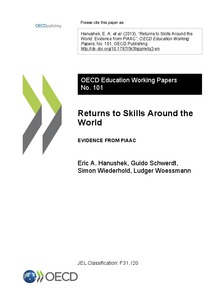Returns to skills around the world. Evidence from PIAAC
"Existing estimates of the labor-market returns to human capital give a distorted picture of the role of skills across different economies. International comparisons of earnings analyses rely almost exclusively on school attainment measures of human capital, and evidence incorporating direct me...
| Main Authors: | , , , |
|---|---|
| Institution: | ETUI-European Trade Union Institute |
| Format: | TEXT |
| Language: | English |
| Published: |
Paris
2014
OECD |
| Subjects: | |
| Online Access: | https://www.labourline.org/KENTIKA-19110277124919384599-Returns-to-skills-around-the-w.htm |
| Summary: | "Existing estimates of the labor-market returns to human capital give a distorted picture of the role of skills across different economies. International comparisons of earnings analyses rely almost exclusively on school attainment measures of human capital, and evidence incorporating direct measures of cognitive skills is mostly restricted to early-career workers in the United States. Analysis of the new PIAAC survey of adult skills over the full lifecycle in 22 countries shows that the focus on early-career earnings leads to underestimating the lifetime returns to skills by about one quarter. On average, a one-standard-deviation increase in numeracy skills is associated with an 18 percent wage increase among prime-age workers. But this masks considerable heterogeneity across countries. Eight countries, including all Nordic countries, have returns between 12 and 15 percent, while six are above 21 percent with the largest return being 28 percent in the United States. Estimates are remarkably robust to different earnings and skill measures, additional controls, and various subgroups. Intriguingly, returns to skills are systematically lower in countries with higher union density, stricter employment protection, and larger public-sector shares." |
|---|---|
| Physical Description: | 44 p. Digital |

